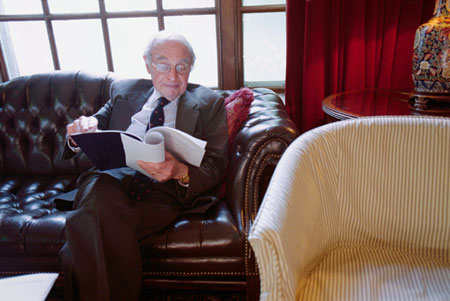Connecting children to resources
Report: Work needed on child mental health

The Harvard Children’s Initiative and the Institute for Community Health in Cambridge released a report last month on the gap-s in Cambridge’s current child mental health system in hopes of making Cambridge a model community in its handling of child mental health issues.
Citing statistics from the 2000 Teen Health Survey and the 2001 Middle Grades Health Survey, officials working on the report said that 56 percent of high school students and 42 percent of middle school students are worried about depression. Suicide attempts by high school students have been between 6 percent and 8 percent over the past six years, with 110 students, or 7 percent reported in 2000. Though not out of line with national statistics, researchers said the numbers are unacceptably high.
The report found that many mental health resources exist in Cambridge, but that there are gaps in coverage, communication, and execution that allow children to slip through the cracks. The researchers also found that training of parents and professionals who deal with children on mental health issues has to be stepped up and that overall community awareness of the problem needs to be raised.
The Harvard Children’s Initiative is one of several interfaculty initiatives aimed at encouraging cross-faculty collaboration and combining energies from different disciplines.
The Institute for Community Health is a collaboration of three nonprofit health care systems, The Cambridge Health Alliance, Mt. Auburn Hospital, and Massachusetts General Hospital.
“It’s clear there are tremendous resources in this city,” said Judith Palfrey, T. Berry Brazelton Professor of Pediatrics at Harvard Medical School, professor of maternal and child health at the School of Public Health and faculty director of the Harvard Children’s Initiative.
Despite the resources and concern for children present in Cambridge, Jack Burke, chair and chief of the Cambridge Health Alliance’s Department of Psychiatry and professor of psychiatry at Harvard Medical School, said studies show that 50 percent of high school students said they have no one in their lives with whom they can talk. In addition, the percentage of middle school students using high school counselors declined from 19 percent 1997 to just 12 percent in 2001.
“We have the resources,” Burke said. “But the children aren’t being connected to them.”
The 63-page report, presented at a reception in the Harvard Faculty Club June 18, examined data from Cambridge’s two regular student health surveys, given in alternate years to high schoolers and middle schoolers. In addition, researchers gathered information through a combination of interviews, focus groups, and meetings.
The findings showed that Cambridge generally has developed many resources in programs, services, and institutions across the city and counts a diverse population among its strengths. Cambridge also already has specific programs, services, and settings that are aimed at supporting children and families. It has increasing collaboration among different institutions in the city and an increasing level of professionalism among early childhood teachers, youth center staff, and YMCA staff.
The report recommends steps to coordinate and focus activities on the problem of child mental health. Specifically, the report recommends improving linkages and communication between programs and services, more training for parents and adults who work with children, and increasing training and education for older teens on the problem. It also recommends expanding prevention activities with targeted prevention for children who are at high risk (such as homeless children, children who have witnessed war, and children who are unsupervised before or after school) and developing more effective outreach to all families.
“Whatever we do we need to make better connections,” Burke said. “We like to say that Cambridge is a model community for the U.S. and the world and we’d like to be even better than we are.”
Organizers of the report aren’t letting it collect dust. They’ve already begun meetings to discuss concrete steps to implement it. Karen Hacker, executive director of the Institute for Community Health and one of the report’s authors, said efforts will focus on particular times in families’ lives that are stressful for children. Organizers are also looking at ways to get funding and at what existing community systems and programs can be modified to help.
“I’m very hopeful we’ll see a lot of things happening in this community,” Hacker said.
At least one community leader said she’s encouraged by the report’s focus on the community. Sylvia Saavedra-Keber, executive director of Concilio Hispano Inc., said she became involved in the child mental health effort during community meetings held while the report was being drafted. She said the report can help focus attention on the social problems underlying child mental health issues.
“With the cooperation of all of us we can make the new generation a little bit better than the current one,” Saavedra-Keber said.
The report was sponsored in part by a grant from the Robert Wood Johnson Foundation.
The report can be found at http://www.hci.harvard.edu.




